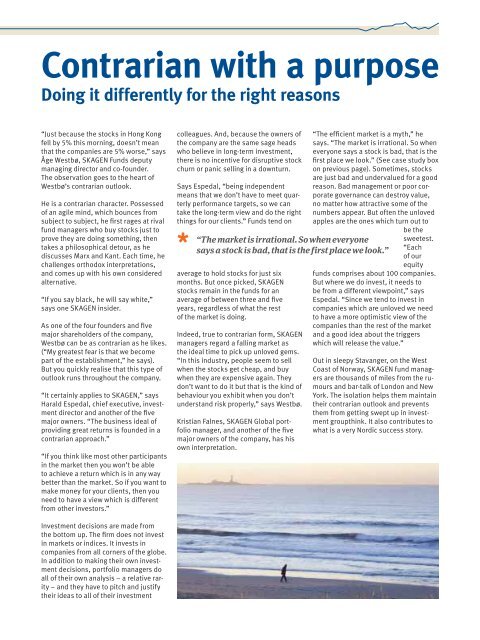Old school New England 92 - Scanorama
Old school New England 92 - Scanorama
Old school New England 92 - Scanorama
You also want an ePaper? Increase the reach of your titles
YUMPU automatically turns print PDFs into web optimized ePapers that Google loves.
Contrarian with a purpose<br />
Doing it differently for the right reasons<br />
“Just because the stocks in Hong Kong<br />
fell by 5% this morning, doesn’t mean<br />
that the companies are 5% worse,” says<br />
Åge Westbø, SKAGEN Funds deputy<br />
managing director and co-founder.<br />
The observation goes to the heart of<br />
Westbø’s contrarian outlook.<br />
He is a contrarian character. Possessed<br />
of an agile mind, which bounces from<br />
subject to subject, he first rages at rival<br />
fund managers who buy stocks just to<br />
prove they are doing something, then<br />
takes a philosophical detour, as he<br />
discusses Marx and Kant. Each time, he<br />
challenges orthodox interpretations,<br />
and comes up with his own considered<br />
alternative.<br />
“If you say black, he will say white,”<br />
says one SKAGEN insider.<br />
As one of the four founders and five<br />
major shareholders of the company,<br />
Westbø can be as contrarian as he likes.<br />
(“My greatest fear is that we become<br />
part of the establishment,” he says).<br />
But you quickly realise that this type of<br />
outlook runs throughout the company.<br />
“It certainly applies to SKAGEN,” says<br />
Harald Espedal, chief executive, investment<br />
director and another of the five<br />
major owners. “The business ideal of<br />
providing great returns is founded in a<br />
contrarian approach.”<br />
“If you think like most other participants<br />
in the market then you won’t be able<br />
to achieve a return which is in any way<br />
better than the market. So if you want to<br />
make money for your clients, then you<br />
need to have a view which is different<br />
from other investors.”<br />
Investment decisions are made from<br />
the bottom up. The firm does not invest<br />
in markets or indices. It invests in<br />
companies from all corners of the globe.<br />
In addition to making their own investment<br />
decisions, portfolio managers do<br />
all of their own analysis – a relative rarity<br />
– and they have to pitch and justify<br />
their ideas to all of their investment<br />
colleagues. And, because the owners of<br />
the company are the same sage heads<br />
who believe in long-term investment,<br />
there is no incentive for disruptive stock<br />
churn or panic selling in a downturn.<br />
Says Espedal, “being independent<br />
means that we don’t have to meet quarterly<br />
performance targets, so we can<br />
take the long-term view and do the right<br />
things for our clients.” Funds tend on<br />
*<br />
average to hold stocks for just six<br />
months. But once picked, SKAGEN<br />
stocks remain in the funds for an<br />
average of between three and five<br />
years, regardless of what the rest<br />
of the market is doing.<br />
Indeed, true to contrarian form, SKAGEN<br />
managers regard a falling market as<br />
the ideal time to pick up unloved gems.<br />
“In this industry, people seem to sell<br />
when the stocks get cheap, and buy<br />
when they are expensive again. They<br />
don’t want to do it but that is the kind of<br />
behaviour you exhibit when you don’t<br />
understand risk properly,” says Westbø.<br />
Kristian Falnes, SKAGEN Global portfolio<br />
manager, and another of the five<br />
major owners of the company, has his<br />
own interpretation.<br />
“The efficient market is a myth,” he<br />
says. “The market is irrational. So when<br />
everyone says a stock is bad, that is the<br />
first place we look.” (See case study box<br />
on previous page). Sometimes, stocks<br />
are just bad and undervalued for a good<br />
reason. Bad management or poor corporate<br />
governance can destroy value,<br />
no matter how attractive some of the<br />
numbers appear. But often the unloved<br />
apples are the ones which turn out to<br />
be the<br />
“The market is irrational. So when everyone<br />
says a stock is bad, that is the first place we look.”<br />
sweetest.<br />
“Each<br />
of our<br />
equity<br />
funds comprises about 100 companies.<br />
But where we do invest, it needs to<br />
be from a different viewpoint,” says<br />
Espedal. “Since we tend to invest in<br />
companies which are unloved we need<br />
to have a more optimistic view of the<br />
companies than the rest of the market<br />
and a good idea about the triggers<br />
which will release the value.”<br />
Out in sleepy Stavanger, on the West<br />
Coast of Norway, SKAGEN fund managers<br />
are thousands of miles from the rumours<br />
and bar-talk of London and <strong>New</strong><br />
York. The isolation helps them maintain<br />
their contrarian outlook and prevents<br />
them from getting swept up in investment<br />
groupthink. It also contributes to<br />
what is a very Nordic success story.












